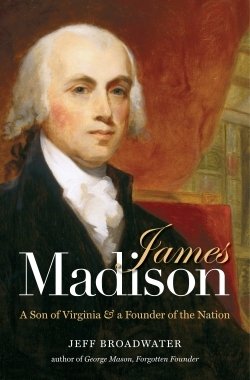James Madison
A Son of Virginia and a Founder of the Nation
The vibrant public images of George Washington, Thomas Jefferson, and John Adams often overshadow that of James Madison, who has entered history as a shadowy, albeit important, figure. It is, after all, Madison’s system of constitutional checks and balances that guarantees the freedoms we enjoy today.
In James Madison: A Son of Virginia and a Founder of the Nation, Jeff Broadwater—a history professor at Barton College— focuses on six key areas of Madison’s life and beliefs in order to better illuminate the character of the man. And so, through “[Madison’s] fight for religious freedom, the debates over the adoption of the Constitution and the Bill of Rights, the origins of the party system, his relationship with Dolley Madison, his performance as commander-in-chief during the War of 1812, and his views on slavery,” the reader gains a thorough understanding of Madison’s political opinions and leadership style.
The evolution of Madison’s thinking on slavery is one of the book’s most fascinating elements, and Broadwater does an admirable job in clearly tracing the changes in Madison’s thoughts on the subject over time. Even in retirement, Madison was plagued by the problem, writing: “the magnitude of this evil among us is so deeply felt, and so universally acknowledged, that no merit could be greater than that of devising a satisfactory remedy for it.”
Despite Broadwater’s thoroughness and attention to detail, Madison’s personality remains elusive, but this isn’t so much a fault of the writer as a testament to the trickiness of his subject. Even during his lifetime, Madison’s success was identified as the result of his work ethic rather than his charisma. Overall, this distinction serves to emphasize just how important an asset Dolley was, using “her charm and connections to raise money for worthy causes … to find jobs for friends and relatives; and, more broadly, to promote bipartisanship and national unity.”
James Madison: A Son of Virginia and a Founder of the Nation isn’t a sweeping historical drama but rather a nitty-gritty political tale, and it will appeal to readers looking for an in-depth analysis of Madison’s revolutionary thinking. While the reader may not gain a vivid sense of Madison the man, there’s certainly a new appreciation for what he accomplished and how great a debt we owe him.
Reviewed by
Oline Eaton
Disclosure: This article is not an endorsement, but a review. The publisher of this book provided free copies of the book to have their book reviewed by a professional reviewer. No fee was paid by the publisher for this review. Foreword Reviews only recommends books that we love. Foreword Magazine, Inc. is disclosing this in accordance with the Federal Trade Commission’s 16 CFR, Part 255.

